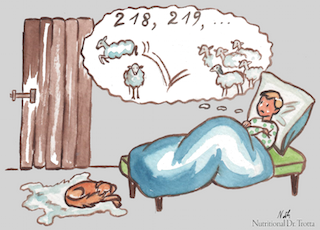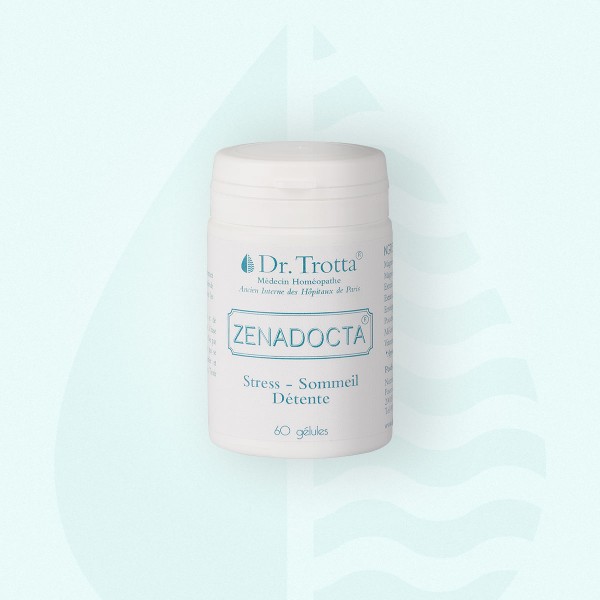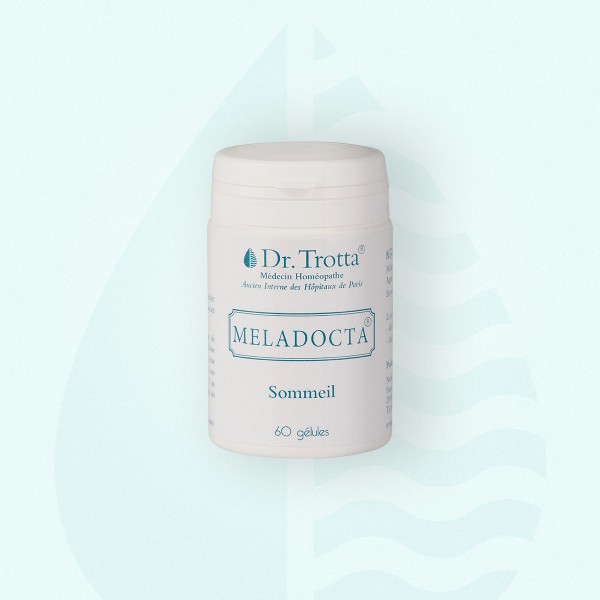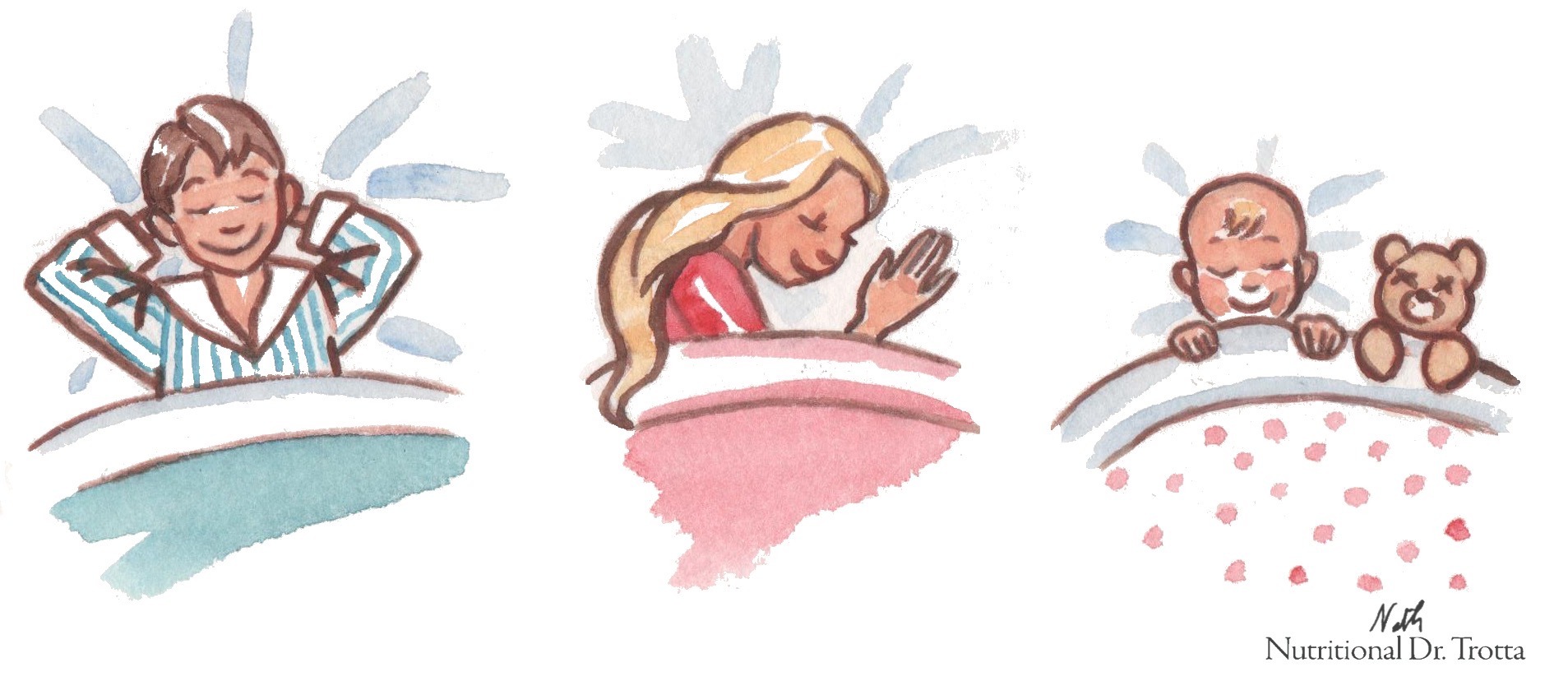How to sleep better naturally?
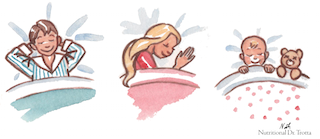

How to sleep better naturally?
No sleeping pills? Drug-free?
Dr Trotta’s advice on how to get a good night’s sleep.
Is there a link between sleep and food?
There is an established link between sleep and food.
The saying “qui dort dîne” (“who sleeps dines”) first explains that sleep is a phase of repair and purification.
Chinese medicine indicates that the liver’s energy cycle is between one and three o’clock in the morning. This explains why sleep is restless, and why we often have insomnia between one and three in the morning when we’ve had too much alcohol or a heavy meal the night before.
This is because the liver is the body’s chemical factory, involved in the elimination and metabolization of food, particularly alcohol. So when we drink too much alcohol or have a heavy dinner the night before, the liver is overloaded by the metabolism of food ingested in excess. Its cycle is disrupted, resulting in poor sleep.
Sleep is an extremely important phase in bodily health, as it is during sleep that the body is cleansed and it is during sleep that the liver eliminates excess metabolites.
To stay healthy, you need to eat a light dinner, and that’s how you’ll get the most restful sleep.
On the other hand, since sleep is a phase of low energy consumption, it’s not necessary for dinner to be too high in calories.
That’s why I recommend a king’s (or queen’s) breakfast, a prince’s (or princess’s) lunch and a poor dinner in terms of calories or quantity of food ingested.
Finally, if you want to lose weight and sleep well at the same time, why not try Dr. Trotta’s by Dr Trotta?
What foods should I avoid if I want to get a good night’s sleep?

– Avoid all stimulants such as coffee, tea or chocolate after 6 p.m.
– Significantly limit industrial foods containing excessive additives, colorants and endocrine disruptors. Like bisfenol A or glutamates. A fast-food diet or a diet based on industrial pizzas, industrially prepared meals, potato chips and industrial pastries is not conducive to sleep.
– Limit white sugar, which is an exciting and addictive substance comparable to cocaine, and promotes blood sugar levels that disrupt sleep.
– Avoid drinking too much alcohol with dinner, i.e. more than three glasses of wine for a man and two glasses for a woman.
In addition to dietary factors electromagnetic factors are extremely important in promoting sleep and, above all, restful sleep.
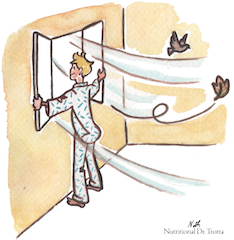 For the past twenty years or so, we’ve been living in a growing electromagnetic soup, which began with the invention of the electricity fairy and has been made much worse by the widespread use of radio waves, television and, for the past 10 years, wi-fi.
For the past twenty years or so, we’ve been living in a growing electromagnetic soup, which began with the invention of the electricity fairy and has been made much worse by the widespread use of radio waves, television and, for the past 10 years, wi-fi.
Our cell phones are considered to be real microwaves, which is why I recommend using headphones to make calls and not sticking the mobile to your ear, as it’s too close to the temporal brain.
At night, Dr Trotta advises you to unplug all electrical appliances on the bedside table, to use a battery-operated alarm clock, to avoid the presence of cell phones in the bedroom at all costs, and to remove televisions and other screens that generate electromagnetic pollution.
It goes without saying that the modem or box generating wi-fi waves should be located as far away from the bedroom as possible.
The bedroom should be aired every day to replenish the atmosphere with negative electrons for restful sleep.
All these electromagnetic waves promote “positive electronization”, i.e. a lack of negative electrons, leading to fatigue and poor sleep.
So what makes for good, restful sleep?
 1/ a healthy diet, as described in the book “L’alimentation la première médecine “, in this blog and in all this training in nutritional education.
1/ a healthy diet, as described in the book “L’alimentation la première médecine “, in this blog and in all this training in nutritional education.
You need to cook for yourself, eat fruit and vegetables every day, eat nuts and oily fish such as sardines, mackerel and herring more than three times a week, and don’t forget legumes (lentils, beans, chickpeas) three times a week.
Use good first cold-pressed rapeseed and olive oil, and eat red meat and dairy products sparingly, i.e. less than two or three times a week.
2/ Regular exercise, walking, airing out, oxygenating.
Regular physical activity of at least 20 minutes a day increases muscular tension and reduces nervous tension by the same amount. Lowering this nervous tension makes it easier to fall asleep and avoid waking up at night.
A brain that is well lubricated by first cold-pressed oils and omega 3 from oily fish, and a brain that is well oxygenated by regular, satisfactory physical activity, is a brain that falls asleep easily and wakes up easily.
3/ Put life’s worries into perspective. We all have problems. Every age has its own specific problem. We need to be positive and look on the bright side of life. It’s better to see the bottle as half full than half empty. See life in pink rather than gray.
What do we do when we’re overwhelmed with worries? And it’s precisely these worries that prevent us from getting to sleep, or wake us up in the middle of the night and we can’t get back to sleep. First of all, you mustn’t keep your worries to yourself. You need to open up to someone who understands and can listen. If you’re lucky enough to be a believer, you should hand over your worries to God, to the angels, to the saints, to your loved ones who have died (but who are actually alive) and who can send us great blessings to help us bear these worries, and turn this trial into a spiritual growth that always favors the common good. Man is not just a juxtaposition of organs, but a marvel with three interlocking levels: body, soul and spirit. Serenity depends on harmony between these three components.
Man is spiritual in essence. Every human being, no matter how agnostic or atheist, has within him or her a little flame of divine essence just waiting to be lit. The purpose of life is to make our divine flame grow until death, which is only a passage to eternal life with God. Many of life’s crises are due to existential and spiritual crises, which we need to recognize in order to accept them and grow spiritually. This is no guarantee of effective restorative sleep, but it does provide the serenity that is likely to promote good sleep.
4/ Finally, you need to know about sleep cycles
Sleep is divided into several stages or cycles.
Each cycle lasts between 1h30 and two hours.
Each cycle is made up of several phases of 20 minutes each, the first being light sleep and the last REM sleep.
The first 20-minute phase is light sleep, when you can wake up easily.
This is generally enough time for a restorative nap. Indeed, for a nap to be effective, you mustn’t sleep for too long. Sleeping for 20 minutes is enough to restore your energy and put your brain to rest.
During the night, as sleep continues, it becomes deeper and deeper, culminating in the last stage of sleep, REM sleep. This sleep is called REM because there is a paradox between numerous bodily movements of the eyes and body, and the phase of maximum rest of the brain corresponding to the dream phase.
You must never wake up during this phase, as it would be like a blow to the head.
To do this, you need to know the length of your sleep cycle.
How do you know the length of your sleep cycle?
It’s very simple: just pinpoint a time in the evening when you feel the first symptoms of fatigue, with stinging eyes, yawning and the urge to go to sleep. You don’t go to sleep because it’s too early. You note the exact time and then you note the time when these same symptoms start again. The interval between these two moments is the length of your sleep cycle, which is generally 1h30 to 1h45.
You therefore need to sleep a number N (plus 10 minutes) of sleep cycles to be able to wake up at the start of the next cycle during light sleep.
 For example, if your sleep cycle is 1h30, you need to sleep a number N x 1h30 to wake up easily, i.e. 4h30, 6h, 7h30 or 9h.
For example, if your sleep cycle is 1h30, you need to sleep a number N x 1h30 to wake up easily, i.e. 4h30, 6h, 7h30 or 9h.
So if you go to bed at midnight, you need to set your alarm clock for 6h10 if you want to sleep for six hours, and for 7h40 if you want to sleep for 7h30, so that you wake up at the start of your light sleep cycle. You’ll wake up easily and feel much less tired during the day.
 On the other hand, don’t set your alarm clock for 5.45 or 7.20 a.m., as this will catch you in the middle of REM sleep, i.e. in the middle of a dream. This will be a brutal shock that will disrupt the brain’s compensatory rest and leave you feeling tired all day long.
On the other hand, don’t set your alarm clock for 5.45 or 7.20 a.m., as this will catch you in the middle of REM sleep, i.e. in the middle of a dream. This will be a brutal shock that will disrupt the brain’s compensatory rest and leave you feeling tired all day long.
It’s as important to know this as it is to know how to count.
And unfortunately we don’t learn this at school, or hardly ever.
Napoleon is famous for having been a very short sleeper, because he instinctively knew how to control his sleep. He was the champion of short naps. He could fall asleep for 10 to 20 minutes just before a battle, only to be refreshed afterwards. A famous painting depicts him asleep on a chair on the eve of the Battle of Wagram in 1809.
Dr Trotta offers 2 supplements to help you sleep better: ZENADOCTA AND MELADOCTA
5/ ZENADOCTA: the Doctor’s supplement to help you fall asleep and prevent you from waking up at night. Recommended for those whose insomnia is due to chronic or acute stress, depression, anxiety or burn-out.
ZENADOCTA has been specially developed and researched to combat stress-related insomnia naturally, and will help you to get a better night’s sleep naturally. Its natural ingredients have been selected by Dr Trotta to work in symbiosis to promote restful, regenerative sleep:
– Rhodiola: fights the effects of chronic stress and recharges depleted batteries after a burn-out (or helps prevent one).
– St. John’s Wort: concentrates the sun’s rays and lifts the spirits when you’re sad or psychologically exhausted.
– Lemon balm and Valerian: 2 plants that soothe, reduce nervousness and promote calm to help you fall asleep and stay asleep all night long.
– Melatonin: Melatonin is a hormone that promotes sleep and repairs neurons at night. This hormone is indispensable in all neurological and psychological pathologies, enabling effective treatment without side effects. Its presence in ZENADOCTA enables insomnia to be treated, and neurodegenerative diseases such as MS (Multiple Sclerosis), Parkinson’s, Alzheimer’s, depression ….etc… to be treated at the same time as endotherapy and scalar waves.
Testimonials from patients who have used ZENADOCTA
“It’s thanks to ZENADOCTA that I can finally fall asleep peacefully and without chemical drugs” Jacqueline sept 2017
“I suffer from tinnitus which isolates me socially, makes me depressed and prevents me from sleeping. My neurologist prescribed anti-depressants that made me sleep all day, but I had to stop them very quickly. Dr Trotta’s ZENADOCTA is the only natural supplement that has enabled me to sleep properly, get a good night’s sleep and thus cope better with my tinnitus.” . R. Janvier 2018
6/ MELADOCTA MELADOCTA: Dr Trotta’s new supplement since 2022 to treat insomnia related to melatonin deficiency. MELADOCTA contains 2mg of melatonin to help you fall asleep and sleep well. Suitable for those with essential insomnia, i.e. not due to stress. Also recommended for all neurological diseases, as melatonin has therapeutic virtues for neurons: melatonin heals neurons at night.
With these tips, you’ll be able to enjoy a peaceful, soothing night’s sleep, the key to good health.
Don’t hesitate to consult Dr Trotta either online (telemedicine) or on site at his Institut de Médecine Naturelle in San Sebastian: his advice and care will help you thanks to an ecological medicine that treats the causes with non-toxic treatments and gives the body back what it needs to function and repair itself. A caring, humane, personalized and participatory medicine, because you are the N°1 actor in your own health.
Dr Pascal Trotta,
Former internist at Paris Hospitals, specialist physician, radiologist, homeopath, founder of the San Sebastian Institute of Natural Medicine
Paseo de los Fueros 3, 20005 San Sebastián, Basque Country
Request an appointment for a consultation with Dr Trotta: Tel 05 54 54 44 43
– on site.
– online.
Order Dr Trotta’s natural supplements:
– Tel: 05 54 54 44 43
– Le laboratoire du Dr Trotta
– or click on the image below for the desired supplement or pack
Nos produits naturels
Need more information and to meet Dr. Pascal Trotta?
Make an appointmentAlso read

The benefits of auricular acupuncture for emotional balance
